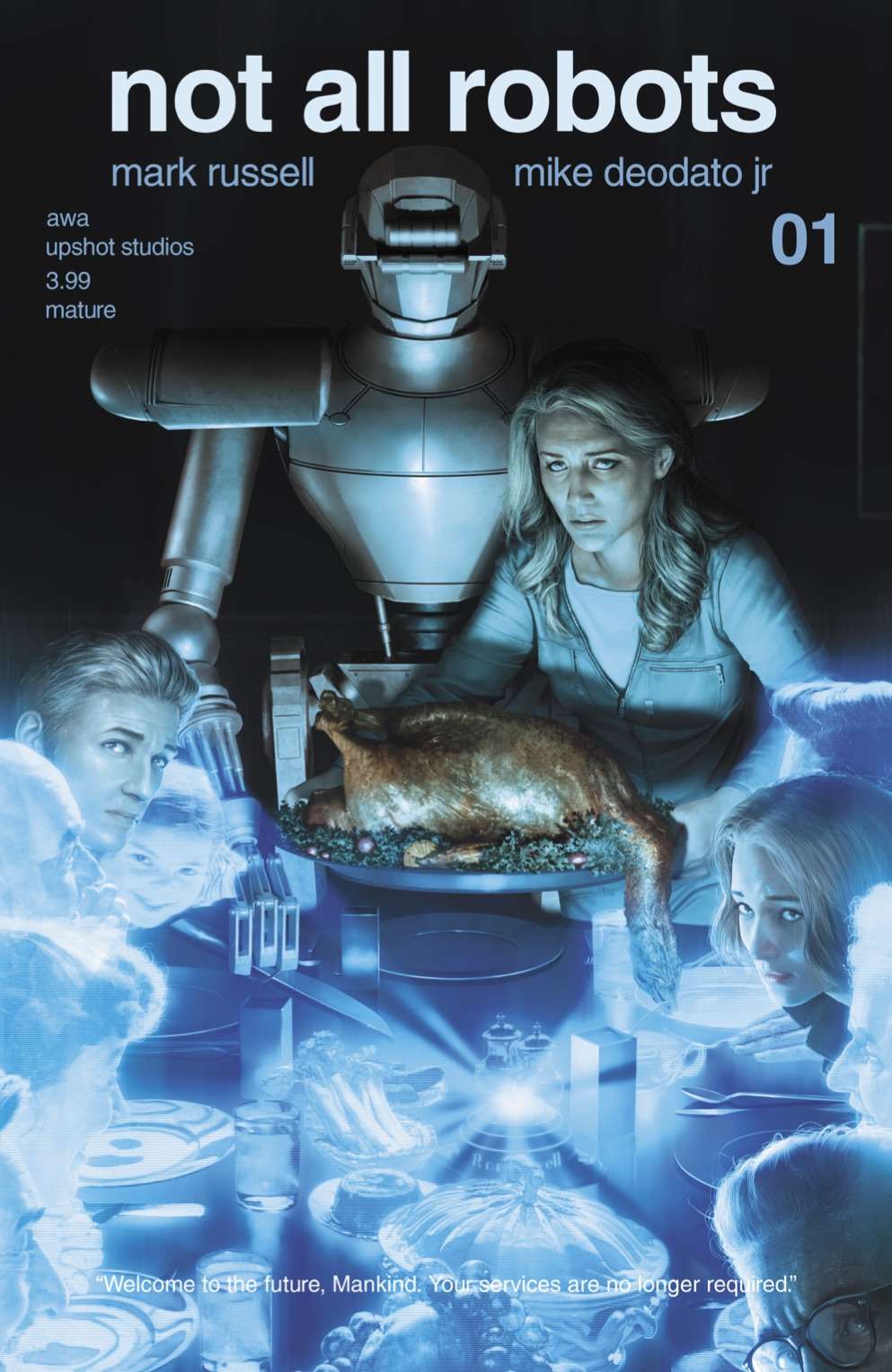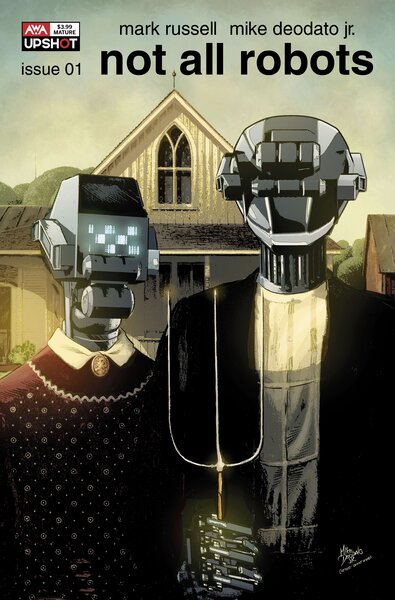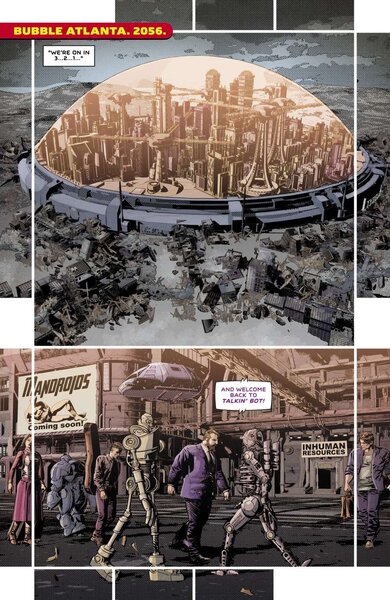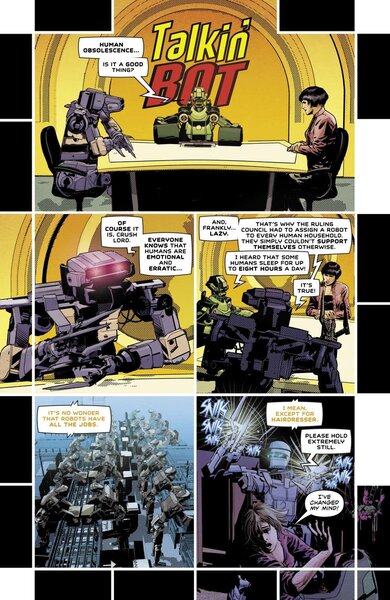Create a free profile to get unlimited access to exclusive videos, sweepstakes, and more!
Mark Russell's 'Not All Robots' is a parable of toxic masculinity & AI supremacy in our capitalist hellscape

"Human obsolescence... is it a good thing?"
How's that for a premise for a comic book?
Not All Robots is the next creator-owned project from writer Mark Russell. Together with superstar artist Mike Deodato Jr., he's created a pitch-black parable about a dystopian vision of future Earth in which an AI-driven robot workforce has made the human race largely unnecessary. The five-issue limited series from AWA Studios debuts on Aug. 4.
I've had the pleasure of reading the first three issues of Not All Robots and can confirm it's an exotic stew of deep science fiction introspection mixed with hilarious observations. And as usual with anything Russell writes — think Second Coming, Billionaire Island, Exit Stage Left!: The Snagglepuss Chronicles — it's also a reflection of some very relevant present-day concerns, such as the importance humanity places on its own usefulness. He wanted to tell a story that ultimately underscored that humanity's worth should be judged by something greater than its functionality.
Russell had high praise for the team at AWA, including Axel Alonso, the former Marvel editor-in-chief who's now chief creative officer at AWA. "Axel and Dulce Montoya have been really good at sort of letting me make my own mistakes and then sort of saving me from myself," Russell says during a conversation with SYFY WIRE. "Like letting me know if this didn't work or that. They're giving me enough rope to not only hang myself, but ultimately to save myself."
Russell says part of the inspiration for the series came from Twitter, of all places, and specifically, the "Not All Men" crowd.
"That movement, where people were on Twitter using toxic masculinity to deny the existence of toxic masculinity, I thought, 'There's gotta be a really good metaphor for that,'" he says. "Those dudes don't allow themselves to actually see what it is they're doing. And then it occurred to me that, if you recast the story with robots and then having humans resenting the robots, then it would work as a really good parable for toxic masculinity."
We're happy to debut the first look at Not All Robots. We have the main cover as well as the variant cover for the first issue that pays homage to a famous painting by Grant Wood, along with the first two pages of the debut issue.
Keep reading below for my exclusive conversation with Russell about the book, as well as some details about his other big new project, Fantastic Four: Life Story for Marvel.
The title of the book really does capture one of the big overall themes of the book, but Not All Robots is about a lot more than just a metaphor for toxic masculinity, isn't it?
It encompasses a lot more than that. Now it also is about how we see ourselves in terms of our economic roles rather than as human beings, but that was really the genesis. That was the germ that spawned the rest of... the ideas I had after that.
The central premise of the story is this is a future in which the human labor force has been rendered obsolete by robot labor. The irony stems from the fact that those robots have humanity under their collective metal foot, while at the same time, working on new machines that will, in turn, make them obsolete. It's like the robots and the humans are trapped in this circular pattern.
The story is about our own obsolescence in a way. The bitter irony of working in a technologically sophisticated capitalist economy is that we're all ultimately building our own replacements. And I want the reader to also see things from the robot's perspective. Like the resentment goes both ways between the humans and the robots, and they both kind of have fair reasons to resent each other. That's why I have the "Talkin' 'Bot" TV show in there [as a framing device]. So the humans don't get let off the hook by any means.
We see a lot of the dynamics of this future society play out in the relationship between the robot Razorball and his "family," the Walters. He's as miserable as any human teenager. And his story starts to take a dark turn.
In a lot of cases, how toxicity and radicalization works is that somebody could have gone a very different way they might have, but for one reason or another, that legitimate resentment or bitterness becomes something worse. And I think that's what happens with Razorball and his other robotic compatriots. And it's largely because of like bad influences, like his friend Kilroy.
Anyone who follows you on Twitter knows you closely follow current events and the news. How much of the ideas for this story and its influences come from some of the things that have been in the headlines in the past year or so? For example, workforce inequality, which has really bubbled to the surface recently.
A lot of it. And I think also from observing how late-stage capitalism, especially how the profits are generally made, not from creating new products and improving things, but by controlling the costs, by keeping the amount you pay the workers down by doing things more cheaply and in creating in its wake a greater human cost. That's kind of what this [story] is, it's about the human cost and ultimately the robot cost to innovation.
So that's something that definitely was on my mind as I was writing about how the gig economy has sort of destroyed the very people it was supposed to make life easier for. Because ultimately it's just another way — as most innovations have done over the last 20 years — of controlling costs; of keeping your company from having to pay anybody any money. That's really what the story of American commerce has been since the 1980s. It was just like, "Well, how can we not pay any retirement benefits to that person? How can we get away with getting an intern to work for free?" And a lot of that sort of was baked into the cake of Not All Robots. Anybody who makes their living as a freelancer or in the gig economy will probably see a lot of themselves in this comic.
The Mandroids are one of the more interesting story threads in Not All Robots. Not to get too spoilery, but this story element sets up what appears to be a major turning point in the series, and also promises to get really weird.
Oh yeah. Buckle up.
The Mandroids really represent all these improvements and increased efficiencies and greater innovations that are really just more efficient ways of screwing people over. Also, we are now more sensitive and we react to people with greater sensitivity in our language and compassion. But really it's just the presentation and underneath it, we're still really treating each other like robots. Even though corporate PR and the way we talk [to] customer service has evolved, it's really just the sugarcoating for ultimately an economy based on treating each other like robots.
How did you partner up with Mike Deodato Jr. for this project? At first glance, I was surprised to see his name as artist on the book, but wow, his layouts and designs here are spectacular.
It was an utter joy for me to get his pages. I mean, he just exceeded expectations every time he turned in artwork. I was blown away when I saw his initial concepts.
I wasn't too familiar with Mike's work before we started working together, but he was really an Axel Alonso [former Marvel editor-in-chief and AWA Studios' chief creative officer] choice. Axel really was hyped on Mike and thought he was a really great artist and he showed me a lot of examples of his work. I was like, "Yeah, this guy would be great." And he did not disappoint. Right off the bat, he got the initial concept very quickly and we had some discussions over what Atlanta should look like and what the characters should look like, but I didn't really have to tell him a whole lot. He just sort of intuitively grasped what I was going for with the script. I think he brought like another dimension to it by using a more realistic art style than I had maybe initially envisioned.
Humor is such an important element of any Mark Russell comic. But this book could be incredibly depressing on one page, and hilarious the next without undercutting the impact of the previous pages. How easy did the humor in this story happen for you?
I feel like [humor] comes easier to me in writing than in conversation, just because I can go back and change something. I'm like the king of thinking of what I should have said five minutes later in a conversation. And so writing really works really well for me as a medium of humor because I'm always wittier the second or third time around when I get a chance to get my thoughts together. So for me, it's an ideal way to present comedy.
I think the comedy isn't there in spite of the darkness, I think in a lot of ways, it's there because of the darkness. The things that I find sort of brutally real are also the kind of things that I find kind of hilarious. As George Saunders once said, "Humor is the truth quicker than you expected it." And I think that's what I try to do in writing, is I just try to say what it is I have to say about the world and as bluntly as possible.
Why did you decide to keep this to a five-issue limited series?
David Mamet had a quote once where he said that writing a play is like running a marathon and writing for television is like running until you die. And that's kind of the way I view a limited series versus an ongoing. I know it's going to be a marathon, it'll be a long run, but I can see the finish line and plan for how fast I should be running. Whereas writing an ongoing comic is just... you're just kind of writing until it sucks, which I don't think is a really good artistic approach for myself.
I was kind of surprised to hear that you were doing Fantastic Four: Life Story, which comes out later this month, because I thought you were kind of done with DC and Marvel work-for-hire stuff.
I've actually got several Big Two superhero projects on the way. I enjoy that writing. I think creator-owned writing is a little closer to my heart, but when you get an opportunity to write something like the Fantastic Four, you better have a good reason to say no. And especially the way they packaged it to me where it's like, they're passing through time in real-life terms. And I get to tell a story, not only about these characters, but also about how they interact with world history. Everything about it, just conceptually, sounded like a dream project to me. And it has been.
Was the FF one of the Marvel titles that you were a big fan of when you were a kid?
Oh yeah, I love Fantastic Four and I think the thing I've always loved about them the most is that they're one of the comics that is more about the characters and their relationship to each other than they are about like, the powers and the fighting. So to me, they've always represented the possibilities of comics as a dramatic medium.
How much of a dive did you do into the FF back issues to find some of the story beats for Life Story?
Not a whole lot, but there were certain issues and storylines I had to go read, just to make sure I was remembering them correctly or to see if there was something I wanted to maybe build an issue around. I tried to come in as fresh as possible. I did go back and read a few just to make sure that I was remembering the things that I was going to build on correctly.
What's your favorite Mark Russell comic, and why is it Second Coming? Seriously, that comic is an instant classic. Find me on Twitter/Instagram and let's talk comics.
Don't forget that Behind the Panel is a multi-platform series. Our video series is loaded with my in-depth interviews with some of the best comic book creators in the business. The Behind the Panel podcast is an audio documentary series that provides unique insight into your favorite creators and stories. Check 'em out, we think you'll enjoy them.
The views and opinions expressed in this article are the author's and do not necessarily reflect those of SYFY WIRE, SYFY, or NBCUniversal.


















